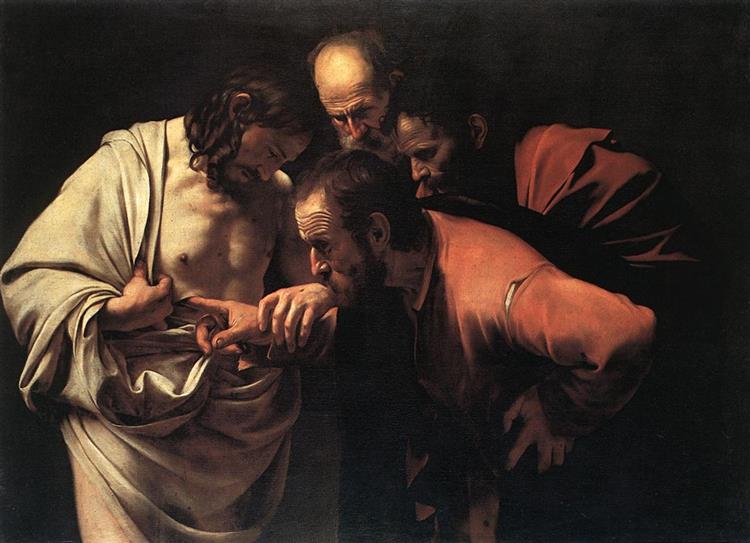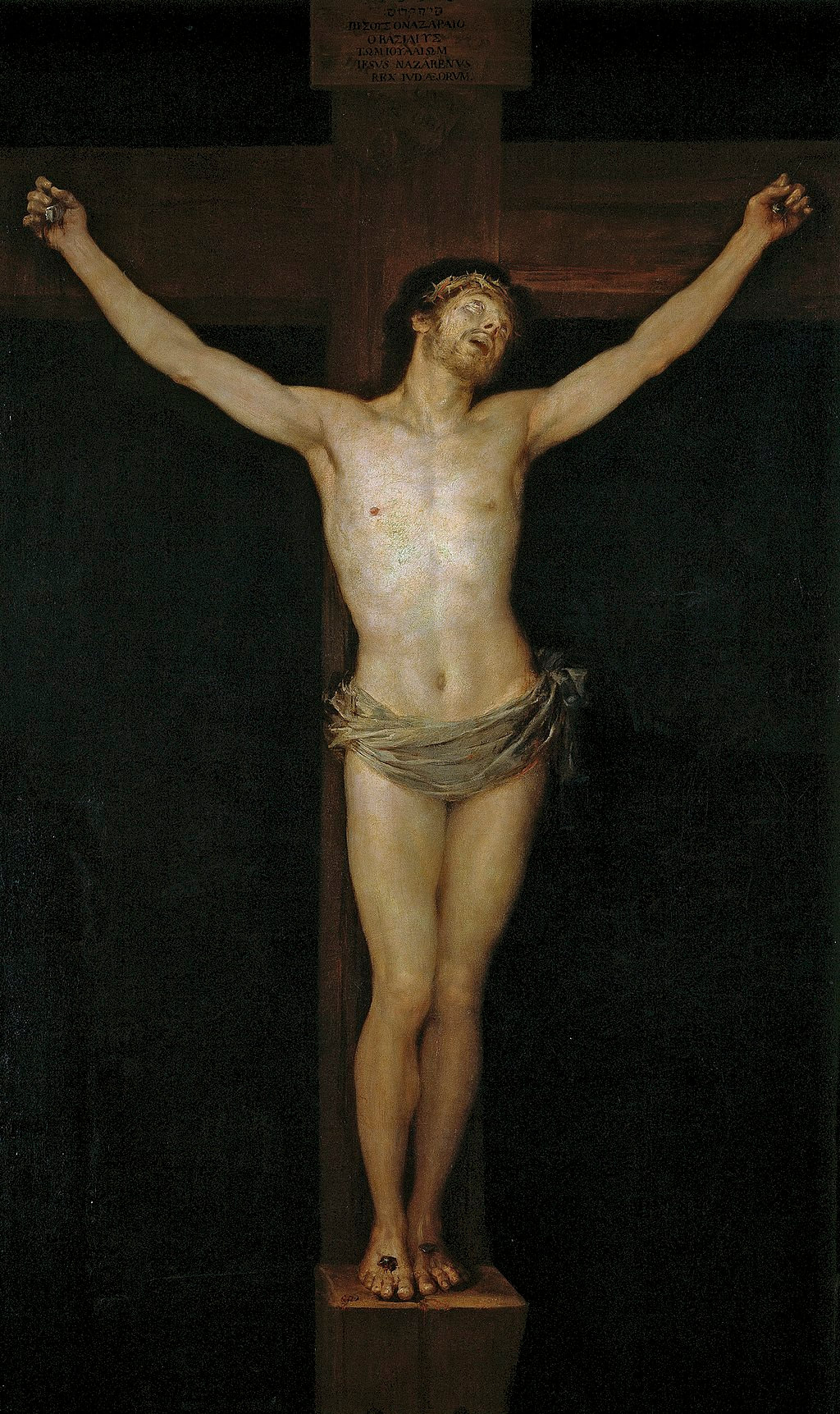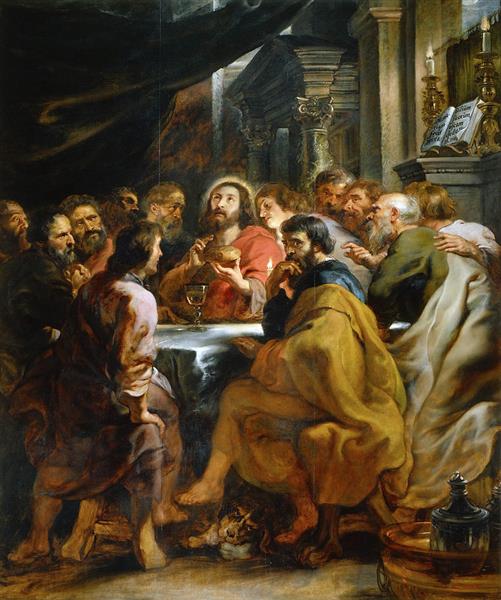John 20:19-31
Pastor James Preus
Trinity Lutheran Church
April 16, 2023
When Jesus appeared to His disciples that first Easter evening, He showed them His hands and His side. He did this to prove to them that He was indeed the same Jesus who had been crucified and buried. The doors were locked, yet Jesus appeared before them without anyone letting Him in. They assumed He was a ghost. But a ghost does not have flesh and bone as Jesus does. Moreover, by showing them His hands, He proved that He was the same Jesus who was nailed to the cross. And by showing them His side, He proved that He was the same Jesus who was pierced after He had died on the cross. St. John recorded, “But when they came to Jesus and saw that He was already dead, they did not break His legs. But one of the soldiers pierced His side with a spear, and at once there came out blood and water. He who saw it has borne witness—his testimony is true, and he knows that he is telling the truth—that you also may believe.” (19:33-35) This is the very Jesus who was crucified, died, and buried. And now, in His exalted state, which cannot be restricted by the laws of physics, He stands before His disciples alive.
The teaching that Jesus was punished in the stead of mankind and suffered for the sins of the world has become very unpopular, even among many who claim to be Christian. They call the vicarious atonement of Christ barbaric and archaic, a remnant of primitive theology, which looks at God as an angry deity who must be appeased by sacrifice. They call the Father forsaking His Son on the cross “divine child abuse.” And so, many have rewritten the reason Jesus died and rose to simply be an expression of God’s love for us.
Yet, Jesus throws that theory in the trash when He meets with His disciples on the evening after He rose from the dead. Jesus shows them the marks of the nails in His hands and the mark of the spear in His side and says, “Peace be with you.” Why did Jesus suffer and die? It was to win peace for us with God. How was this peace obtained? Jesus won for us forgiveness of sins by paying for our sins by suffering and dying on the cross for us. He makes this clear by saying, “If you forgive the sins of any, they are forgiven. If you withhold forgiveness from any, it is withheld.”
Jesus won the victory over sin, death, and hell for us by bearing our sins on the cross and dying for them. His blood makes propitiation for the sins of the whole world. The Father vindicated Jesus, accepting His sacrifice for our sins when He raised Jesus from the dead. When Jesus gave His disciples the authority to forgive and withhold forgiveness of sins, He gave to His Church what He had won for them on the cross. The evening before Jesus suffered on the cross, He told His disciples, “[The Spirit of Truth] will take what is mine and declare it to you.” (John 16:14) And here, after Jesus has risen from the dead, He says to His disciples, “Receive the Holy Spirit. If you forgive the sins of any, they are forgiven.” The Holy Spirit works in the Church by taking what Christ earned on the cross, that is, the forgiveness of sins, and giving it to sinners.
This is called the Office of the Keys, which the children learn is the special authority, which Christ has given to His Church on earth to forgive the sins of repentant sinners and to withhold forgiveness from the unrepentant as long as they do not repent. The Office of the Keys exercises its power with words. A man tells a sinner that his sins are forgiven, and they are forgiven. The Church is able to exercise this immense power with words, because Jesus has already done the work to earn our forgiveness. The Church does not earn your forgiveness. The Church does not offer up propitiatory sacrifices to God to appease His wrath. The Church takes what Jesus gives Her, the authority to forgive sins, and she wields this power with words.
When Christ gave His Church the authority to forgive sins, He instituted the Office of the Holy Ministry. He did this so that His Church may call men to preach the Gospel, baptize, administer the Lord’s Supper, and yes, forgive sins. We call these men pastors, which means, shepherds. When a pastor forgives sins, he is not exercising his own authority, but the authority of Christ, which He has given to His Church on earth. St. Paul, who Himself was a pastor, wrote of pastors, “This is how one should regard us, as servants of Christ and stewards of the mysteries of God.” (1 Corinthians 4:1) The job of a pastor is to manage the mysteries of God, which Christ has given to His Church on earth.
There are some, who claim that pastors cannot forgive sins, because men cannot forgive sins; only God can forgive sins. In fact, there are very few churches you could go to where the pastor will forgive your sins either publicly or privately. Yet, to deny that pastors have the authority to forgive sins is to deny that the Church has the authority to forgive sins. And to deny that the Church has the authority to forgive sins is to deny Jesus’ clear words, which say, “If you forgive the sins of any, they are forgiven. If you withhold forgiveness from any, it is withheld.” (John 20:23) and, “Whatever you bind on earth will be bound in heaven, and whatever you loose on earth will be loosed in heaven.” (Matthew 18:18) To deny that the Church has the authority to forgive sins is to deny that Jesus truly won forgiveness of sins for everyone on the cross. When the Church forgives sins, she simply declares what Christ has done. She simply exercises the authority which Christ has given to her. Because Jesus has won our pardon, the Church has the right to declare that pardon to us.
Finally, to deny that the Church has the authority to forgive sins is to deny that the Church is the bride of Christ! A husband gives everything that He owns to His wife, even His own body. Christ did no less for His bride, the Church. And since Christ has won the power to forgive the sins of the world, the Church has this power, because everything her Husband has belongs to her. Furthermore, Christ Jesus, her Bridegroom, explicitly gave His Church the authority to forgive sins.
Without the forgiveness of sins, the Church is not the Church. We confess in the creed, “I believe in the Holy Christian Church, the Communion of Saints, the forgiveness of sins.” The Holy Christian Church is the community of saints whose sins are forgiven. The Holy Christian Church is where sins are forgiven. And there is forgiveness of sins no where on earth except in the Christian Church, where the Gospel is proclaimed! If you separate yourself from the Christian Church, then you separate yourself from the forgiveness of sins and from Jesus who won forgiveness for you.
What troubles people more than the claim that the Church can forgive sins is the claim that the Church can withhold forgiveness. Yet, it is essential to believe that the Church has the authority to withhold forgiveness. The Church has the authority to withhold forgiveness, because a sinner can only be forgiven through faith. Jesus gave the Church the authority to forgive sins by speaking words. He did this, so that sinners could receive forgiveness freely, as a gift, through faith. Yet, if a sinner does not have faith, then he cannot be forgiven.
The reason the Church will refuse to forgive sins, is because a person publicly shows that he does not have faith. The goal of the Church is for everyone to believe the Gospel, receive the forgiveness of sins, and be saved. But those who continue in sin without repenting do not have faith. They may think they have faith, because they know some basic facts about the Christian religion. But that is not faith. Faith is trusting in God’s mercy for Jesus’ sake to forgive sins. But if you are not sorry for your sins, then you do not have faith.
For this reason, pastors should not only preach the Gospel that Jesus has won forgiveness for all people, but they should also preach the Law, that sinners deserve to go to hell and that they must repent. And for this reason, pastors should not only forgive the sins of repentant sinners, but withhold forgiveness from the unrepentant as long as they do not repent. They should do this for the sake of their faith, so that they may be saved.
Thomas is criticized, because he doubted Jesus’ resurrection. He wasn’t there when Jesus first appeared to His disciples, and He didn’t believe the disciples’ report. For this reason, Thomas is often called doubting Thomas. So, there are two things you need to know about Thomas and his doubting.
First, by doubting, Thomas did what every other disciple would have done and did do. All the Gospel accounts of the resurrection report that the disciples doubted Jesus’ resurrection when they first heard of it. Thomas did what they all did. Thomas’s nick-name was the Twin. St. John records Thomas speak four times in his Gospel. In each time, Thomas says what the other disciples were thinking, whether he is confessing his faith or doubt.
Second, Thomas’s doubt was a damnable sin. Thomas cannot defend himself that he simply did what all the other disciples did when he doubted Jesus’ resurrection. Thomas deserved to go to hell for his doubt and he would have gone to hell had Jesus not graciously revealed Himself to Thomas and opened the sceptic’s eyes to faith. Thomas doubted the report of Jesus’ apostles that He had risen from the dead. By doubting their report, he doubted Jesus Himself, who had multiple times predicted His own death and resurrection in Thomas’s hearing. And by doubting, he disbelieved the Scriptures of the Old Testament.
Jesus rebuked Thomas for his unbelief, telling him, do not be an unbeliever, but a believer. He then said, “Blessed are those who have not seen, yet have believed.” Those words are meant for us. We have no less of a certain witness of Jesus’ death and resurrection than Thomas did. We have the writings of the holy Apostles, who witnessed Jesus’ death and resurrection, and recorded it by inspiration of the Holy Spirit Himself. St. John wrote, “These are written so that you may believe that Jesus is the Christ, the Son of God, and that by believing you may have life in His name.” (John 20:31) The purpose of Holy Scripture is so that you may believe in Jesus Christ and have eternal life from Him, having your sins forgiven. The purpose of the Church is so that you may believe that Jesus is the Christ, who forgives your sins and grants you eternal life. The Church is built on the foundation of the Apostles and Prophets, Christ Jesus being the cornerstone.
So, we find Jesus in His Church. And we find His Church where the forgiveness of sins is proclaimed. And we find the proclamation of the forgiveness of sins only where Holy Scripture is followed. Where the Church is built on Holy Scripture, we have certainty in her words. And these words speak forgiveness and salvation to all who will believe.
The story of Thomas’s doubt is a dire warning to us. Thomas wasn’t the only one who doubted. Don’t take comfort in that. That means that doubt can find you. Doubt damns. We learn from Thomas that we should not doubt, because Holy Scripture gives us certainty in our salvation by giving us certainty in Christ. And where the Church is founded on Scripture, we have certainty that the Church is founded on Christ. The Office of the Keys is the most powerful authority wielded on the entire earth; greater than the authority of Congress to declare war or of the president to launch a nuclear weapon. It is the authority to open the very gates of heaven. And Christ has given this authority to His Church on earth, so that you may not doubt, but firmly believe that your sins are forgiven before God in heaven. Amen.





 RSS Feed
RSS Feed